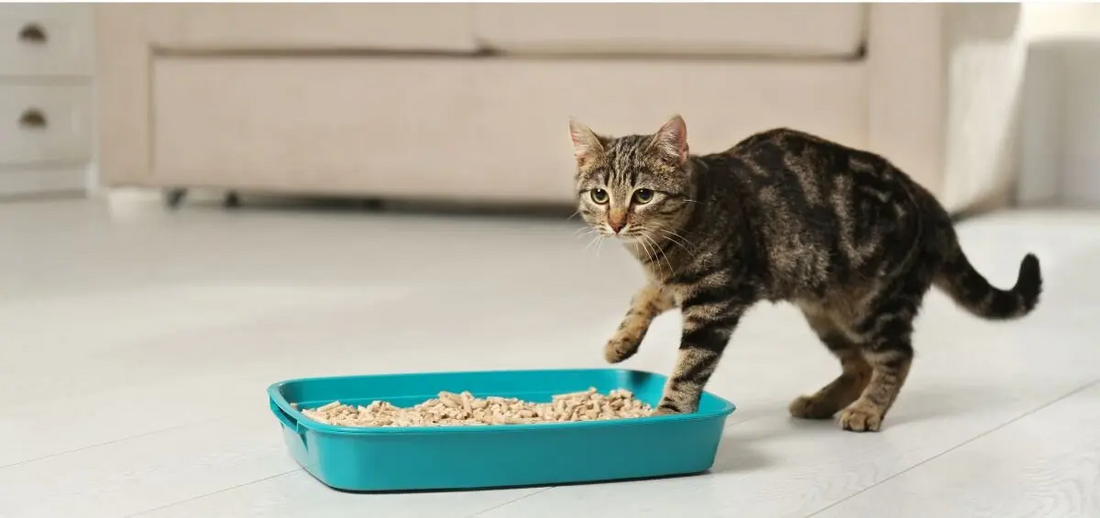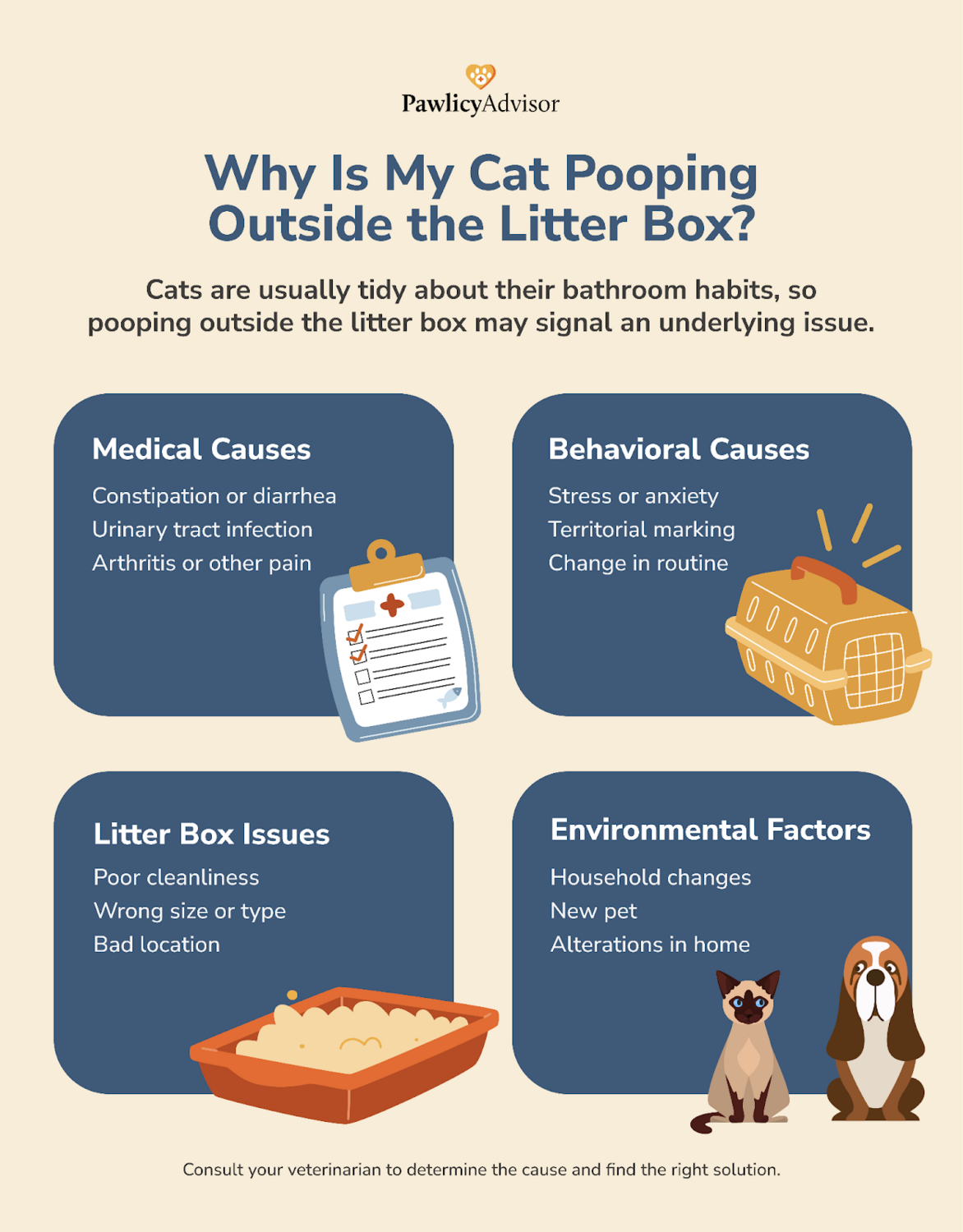
Why Is My Cat Pooping Outside the Litter Box?
Share
Cats are usually meticulous about their bathroom habits, so when they poop outside the litter box, it can be frustrating and concerning for pet parents. This behavior can stem from various medical, behavioral, and environmental factors. Understanding the root cause is essential to finding the right solution.
Looking to save on vet bills? See if pet insurance is right for you.
Why do cats poop outside the litter box?
Medical causes
If your cat suddenly starts eliminating outside the litter box, medical issues could be to blame. Common health problems that may contribute to this behavior include:
- Constipation: Cats may associate the litter box with discomfort if they experience pain while defecating, causing them to avoid using it.
- Diarrhea: Loose stools can be difficult to control, causing accidents if your cat can’t make it to the litter box in time.
- Urinary tract infections (UTIs): While primarily affecting urination, some cats with UTIs may defecate outside the box due to a general litter box aversion.
- Arthritis: Older cats with joint pain may find climbing into a litter box with high sides difficult.
- Gastrointestinal disorders: Conditions like inflammatory bowel disease (IBD) and food allergies affect the gastrointestinal (GI) tract, causing irregular bowel movements or pain.
Solution: If your cat experiences any of these symptoms, consult a veterinarian immediately. A medical evaluation can help you determine whether a health issue is causing litter box avoidance.
Behavioral causes
Behavioral factors also influence a cat's reluctance to use the litter box. In fact, house soiling is the most common behavioral problem reported by cat parents.1
Some behavioral factors that may influence house soiling include:
- Stress and anxiety: Changes in routine, loud noises, or new people in the household can create anxiety that leads to inappropriate elimination.
- Territorial marking: Some cats use feces to mark their territory, especially in multi-pet households.
- Litter box aversion: Negative experiences, such as being startled while using the litter box, can lead to avoidance.
Solution: Reducing stressors, using pheromone diffusers, administering anti-anxiety medication, and providing a consistent routine can help manage behavioral issues. Talk to your vet if you have behavioral concerns about your cat.
Litter box issues
Your litter box setup could deter your cat from using it consistently. Consider the following factors:
- Cleanliness: A dirty litter box may cause a cat to seek alternative locations to eliminate.
- Size and type: Some cats prefer larger boxes, while others may be sensitive to covered versus uncovered designs.
- Location: Placing the litter box in a noisy or high-traffic area may discourage use.
- Number of boxes: The general rule is one litter box per cat, plus one extra, and at least one litter box per floor.
Solution: Regularly clean the litter box, experiment with different litter types, and ensure an adequate number of boxes in quiet, accessible locations.
Environmental factors
Changes in a cat’s surroundings can lead to litter box problems. Common environmental triggers include:
- Household changes: Moving to a new home or rearranging furniture can unsettle a cat.
- New pets: Introducing another cat or dog can lead to territorial disputes.
- Environmental changes: Renovations, new scents, or schedule alterations can impact a cat’s behavior.
Solution: Gradually introduce changes, provide safe spaces, and maintain consistent feeding and playtime routines.

Does pet insurance cover problems associated with cats pooping outside the litter box?
Pet insurance can help cover medical conditions contributing to inappropriate elimination, but typically won’t cover behavioral issues unless they are linked to an underlying health condition.
Medical issues
Many pet insurance plans cover diagnostic tests, treatments, and medications for health conditions, such as UTIs, arthritis, and gastrointestinal disorders. If a veterinarian determines that your cat’s litter box issue stems from a medical problem, insurance may help offset the cost of treatment.
Behavioral issues
Most pet insurance policies cover behavioral issues only when they are related to a medical condition. Some policies offer optional add-ons for behavioral therapy, so checking with your provider is essential.
How to choose the right cat insurance
When selecting pet insurance, consider the following:
- Coverage for medical conditions: Ensure the plan covers illnesses that could lead to litter box issues.
- Exclusions for pre-existing conditions: If your cat has a history of litter box problems, some policies may exclude related conditions from future coverage.
- Optional behavioral coverage: When available, behavioral add-ons can provide additional financial support.
Cats pooping outside the litter box is a complex issue with many potential causes. Identifying whether the problem is medical, behavioral, or environmental can help you take the necessary steps to resolve it.
Consulting a veterinarian, maintaining a clean and comfortable litter box environment, and considering pet insurance for medical expenses can help keep your feline friend happy and healthy.
Your cat's health is priceless; let's protect it together.
Frequently asked questions about why cats poop outside the litter box
What’s the most common reason cats stop using the litter box?
Medical issues like constipation or arthritis are often the culprit, especially in older cats. Always consult a vet before assuming a litter box problem is solely behavioral.
How do I know if it's behavioral and not medical?
A vet visit is the first step to finding out whether litter box issues stem from a behavioral or medical problem. If your cat gets a clean bill of health, consider stressors, routine changes, or territorial issues as potential behavioral causes.
Can I fix the problem by changing the litter or box type?
Possibly. Some cats are picky about box size or litter type. Try a larger, uncovered box with unscented litter in a quiet location.
Will adding another litter box help?
Possibly. The rule of thumb is one box per cat, plus one extra. More boxes in different areas can reduce territorial stress and prevent crowding.
Is pooping outside the box ever a sign of dominance or marking?
Yes, especially in multi-pet households. Some cats use feces to mark their territory, particularly when they are stressed or insecure.
Can pet insurance help with this issue?
Many pet insurance plans cover diagnostics and treatments if your vet finds an underlying medical condition. Behavioral problems, however, are typically not covered unless caused by a health issue.
What should I do if my cat keeps pooping outside the litter box?
Start with a vet checkup. After ruling out a medical issue, try reducing your cat’s stress, adjusting the litter box setup, and maintaining a consistent routine. Behavioral therapy may also be helpful in persistent cases.
